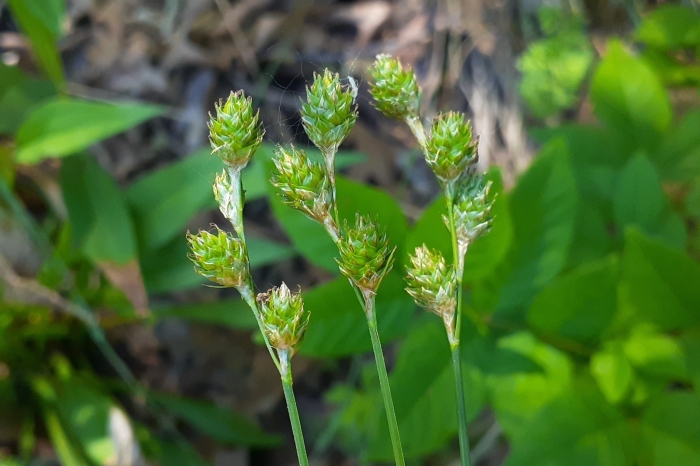Shortbeak Sedge
(Carex brevior)
Shortbeak Sedge (Carex brevior)
/
/

Quinten Wiegersma
CC BY 4.0
Image By:
Quinten Wiegersma
Recorded By:
Copyright:
CC BY 4.0
Copyright Notice:
Photo by: Quinten Wiegersma | License Type: CC BY 4.0 | License URL: http://creativecommons.org/licenses/by/4.0/ | Rights Holder: Quinten Wiegersma | Publisher: iNaturalist | Date Created: 2021-06-17T17:55:15Z |






























Estimated Native Range
Summary
Carex brevior, commonly known as Shortbeak Sedge, is a deciduous perennial grass native to a variety of habitats including open woodlands, meadows, prairies, and along stream banks across much of the United States and parts of Canada. It forms dense tufts with short-prolonged rhizomes, sometimes appearing elongated. The flowering culms are 15–120 cm (5.9–47.2 in) tall with 3 to 5 leaves per culm. Few vegetative culms are produced, and unlike some other sedges, they are not strikingly 3-ranked. The leaf sheaths are white and papery, and the ligule is 2.2–3.3 mm (0.087–0.13 in) long. The inflorescence is open, brown, up to 6.5 cm (2.6 in) long with between 3 and 7 distant, distinct spikes per culm. Carex brevior flowers in mid-May and early June, fruiting in early to mid-summer.
Shortbeak Sedge is valued for its adaptability to various light conditions and soil moisture levels, making it a versatile choice for naturalistic plantings, rain gardens, and restoration projects. It is also used for erosion control due to its dense root system. In cultivation, it thrives in full sun to full shade and tolerates a wide range of soil moisture conditions, from dry to wet, preferring soils with medium drainage. While it is not known for showy flowers, its grass-like appearance adds texture to garden designs. Carex brevior is relatively low-maintenance, but it can spread if conditions are favorable, so gardeners should consider this when planting.CC BY-SA 4.0
Shortbeak Sedge is valued for its adaptability to various light conditions and soil moisture levels, making it a versatile choice for naturalistic plantings, rain gardens, and restoration projects. It is also used for erosion control due to its dense root system. In cultivation, it thrives in full sun to full shade and tolerates a wide range of soil moisture conditions, from dry to wet, preferring soils with medium drainage. While it is not known for showy flowers, its grass-like appearance adds texture to garden designs. Carex brevior is relatively low-maintenance, but it can spread if conditions are favorable, so gardeners should consider this when planting.CC BY-SA 4.0
Plant Description
- Plant Type: Grass
- Height: 1-3 feet
- Width: 1-3 feet
- Growth Rate: Rapid
- Flower Color: N/A
- Flowering Season: Summer
- Leaf Retention: Deciduous
Growth Requirements
- Sun: Full Sun, Part Shade, Full Shade
- Water: Low, Medium, High
- Drainage: Medium
Common Uses
Bird Garden, Deer Resistant, Drought Tolerant, Erosion Control, Groundcover, Low Maintenance, Street Planting
Natural Habitat
native to a variety of habitats including open woodlands, meadows, prairies, and along stream banks across much of the United States and parts of Canada
Other Names
Common Names: Plains Oval Sedge , Short-Beak Sedge , Short-Beaked Sedge , Kaninstarr
Scientific Names: Carex brevior , Carex brevior var. brevior , Carex straminea var. brevior , Carex festucacea var. brevior
GBIF Accepted Name: Carex brevior (Dewey) Mack. ex Lunell